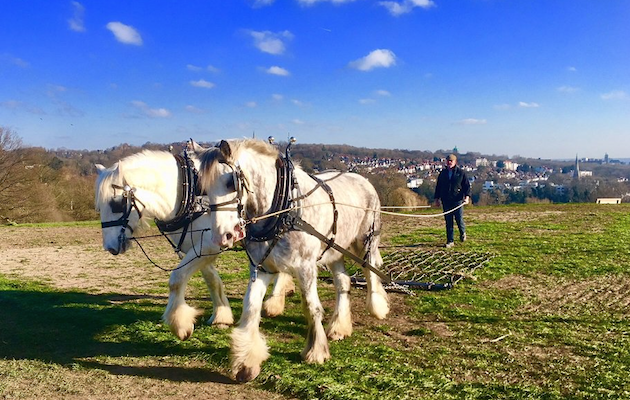Three Suffolk stallions are visiting a pioneering breeding centre after a successful campaign to save Britain’s heavy horses reached £25,000.
The trio is made up of Whatton Albert, owned and bred by Whatton Manor Stud, Craikhow Hall Jensen, owned by Bruce Langley McKim of Thropeley Stud, and Thornfield Pendragon.
The Rare Breeds Survival Trust (RBST) launched a campaign in November 2017 to save Britain’s heavy horses.
Suffolk horses are on the RBST’s critical list of endangered breeds, meaning they are at risk of extinction within the next 10 years.
There are now fewer than 300 Suffolk horses left in the UK, with the number of breeding females dropping from 1,334 in 1947 to 73 in 2017.
The trust has so far raised more than £25,000 through its appeal, which is being put towards the collection and storage of semen from Suffolk, Clydesdale and Shire horses.
Tullis Matson and the team at Stallion AI Services in Shropshire are using the latest technological and scientific advances to preserve these breeds’ gene pools.
“At Stallion AI Services, we work tirelessly to ensure that our semen collection and freezing processes yield the best possible outcome in terms of semen fertility and quality,” explained Tullis.
“This allows us to store vital genetic material for years to come and will enable future breeders to maintain the diversity of breeds whose numbers have become critically low.
“We are now able to do much more and offer solutions to the very real problems faced by conventional AI technologies in addressing issues such as dwindling numbers of breeding females.”
He added there were half as many fillies born as there were colts between 2014 and 2016.
“Thanks to advances in science and technology developed in collaboration between us and some of the world’s most renowned experts, we are developing processes that will — for the first time in the history of equine reproduction — allow us to sex live semen,” said Tullis.
“With greater ability comes greater responsibility. We are serious about using our technological and scientific advances as a force for good.
“By addressing the issue of producing the numbers of breeding females essential to the survival of breeds like the Suffolk, we are closing the circle on reproduction and preservation and in order to save these lovely horses for future generations.”
Article continues below…
You might also be interested in:

Adorable Suffolk foals help to promote breed
The Suffolk horse is rarer than the giant panda with the number of breeding mares left in the UK estimated

Rare Suffolk stallion makes his hunting debut
The Suffolk is one of a team stallions — whose owner has dispelled one myth about entire males in the

Shires in the city: how working horses protect London’s green spaces
Nobby and Heath worked to repair the ground that had been churned up by runners on Hampstead Heath
The Suffolk Horse Society now has 20 licensed stallions on its register.
The RBST, Stallion AI Services, Suffolk Horse Society and Twemlows Hall Stud have been working in partnership to make best use of mares and AI technologies to boost the breed’s numbers.
In 2017, 47 mares were covered with 16 stallions and by the end of the season, 27 had been scanned and confirmed in foal.
RBST’s chairman of trustees Gail Sprake added the charity started to collect semen from stallions of endangered breeds in 2002.
“So far, we have collected or been gifted over 4,000 doses of semen from 72 stallions of 14 breeds,” she said.
“Between 1900 and 1973, the United Kingdom lost 26 of its native breeds.
“We are extremely proud that since our foundation in 1973, and thanks to a lot of hard work and the generosity of our supporters, not one of the breeds on our watch list has become extinct.
“This is not a time for complacency, but certainly for optimism, as modern technology and heritage work hand in hand to preserve the animals that form such a central part of our national history.”
For all the latest news analysis, competition reports, interviews, features and much more, don’t miss Horse & Hound magazine, on sale every Thursday




